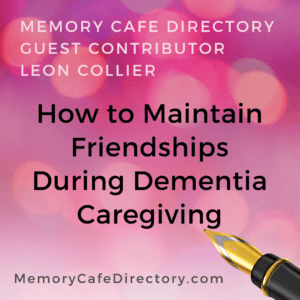Memory Cafe Directory posts and/or links to retailers can be advertising, sponsored, or affiliate links. We may earn a small commission from them. Thank you.
How to Maintain Friendships During Dementia Caregiving
Submitted by Guest Contributor:
Leon Collier
As one writer put it, there is no universal formula for expressing compassion to another person. Every situation is unique and demands a unique approach. Caring for people with dementia and other mental diseases that affect their daily functioning is difficult. In these cases, friendship is very important. Even though you may think that it might be easier to not form an attachment to the people you care for, this is inevitable.
Especially because they might not have so many friends left by their side, due to their dementia and mental problems. Being friends with someone that has Alzheimer’s or dementia is indeed challenging, but it also depends on the stage of the disease.
However, it is understandable why some people stop visiting or contacting their friends with dementia. Maintaining relationships with your friend who has dementia can sometimes end up being heart-wrecking. Forgetting stories and details, repeating some stories all over again, or having severe anxiety and panic attacks are some of the things that make the friendship more difficult to maintain.
So, how can you do this as a caregiver?
A Different Meaning of Friendship
According to essay writers who offer custom writing services on psychology topics, it is very important to be friends with someone who has dementia. But in this case, the definition and meaning of friendship might be different.
In a friendship, both people invest in that relationship. In the case of dementia and other neurodegenerative diseases that are incurable, they result in the degeneration or death of nerve cells. This means that the person with dementia will not be able to respond to your friendship the way you might want or expect.
This is why it is important to be able to redefine your meaning of friendship. They will surely benefit from your friendliness even though sometimes it might appear that their disease is only getting worse. And since there will be few friends left to visit them, you will become their main support.
One of the ways you can do this is to let your friend set the tone of your interaction. If they are sad, put yourself in their place and respond empathically to their sadness. If they are cheerful, follow along. When someone sees that their emotion is understood and accepted they will feel better.
Compassion and Attention
Caring for someone with dementia can leave you empty at the end of the day. It is something noble, but difficult to cope with. If you want to maintain friendships during dementia caregiving, you need to be compassionate and pay attention to the needs of those you care for. Even though the symptoms might manifest slowly, they can also take you by surprise and show up only in some moments or events.
However, dealing with these abrupt behavior changes is difficult and it may keep other friends away. And you, as a caregiver, are the one that can support people with dementia with your friendship. Paying attention to how their needs change will help you address them better. And if you do this compassionately, they will feel better. A research study says that people need reassurance that they still are a part of society, despite their diagnosis. Give them this reassurance and your friendships will flourish.
Effective Communication
It is important to know the right approach whenever you communicate with these people. Do not focus on the subject of their illness. People with dementia remain the personalities they were before the diagnosis. Find out their strong sides – their hobbies, favourite topics of discussion, something that will be engaging for both of you.
When you are having a conversation, it is essential to look them in the eyes. Call them by their name every time you want to talk with them and keep the conversation at an adult-to-adult level. This is essential because many caregivers think that they need to keep the conversation at an adult-to-child level, which is not true. Just speak slower and then give them time to understand everything you try to send them.
And the most important part you need to keep in mind is to not correct them. Indeed, people with neurodegenerative diseases might not tell you the accurate or true response to your question. And you might be tempted to correct them if they say something wrong, but this is not the approach you need to take. Step into their universe and world and allow them to express their feelings and thoughts. Also, validate and encourage them to do this and use body language as much as you can.
Do Not Forget About Your Friends Either
Being a caregiver for people with dementia is an honest thing to do, but after months or weeks of caregiving, you might feel stressed, anxious, and empty. In these cases, it is important to not forget to connect with your other friends too.
Be sure you have someone you go to when you need a piece of advice or suggestions, but also to unwind and get some support.
Feelings you might have from time to time as caring for someone with dementia can leave you without any energy. Social support is very important in everyone’s life and it can alleviate the symptoms of burnout, stress, anxiety, and depression.
Ending Note
Maintaining friendships during dementia caregiving can seem difficult. As symptoms show up slowly, you might have the time you need to adjust to these changes. However, they are not consistent, they can appear episodically and their severity is changing over time.
Reaching the people you care for can be complicated, so you need a few strategies to make it work. Even though friendships are two-way relationships, as a caregiver for someone with dementia, the relationship will mostly be one-way.
You need to approach them with compassion and pay attention to how you communicate with the person to make sure you reach them. Do not forget about the importance of friends either and find someone to listen to you when you need it.
Leon Collier

Leon Collier
Leon Collier is a blogger and academic writer from the UK who works with biostatistics assignment help, an online service with 3D Modeling Software. He likes trying new subjects and is always focused on proving his worth as a writer in new and challenging writing areas.
His hobbies are reading books and playing tabletop games with his friends.
You can reach him via Twitter @LeonCollier12.
Become a Contributor!
 Do you want to be a Memory Cafe Directory contributor? If you have helpful information to share with our community, read about the guidelines, then get in touch to discuss what you have to offer.
Do you want to be a Memory Cafe Directory contributor? If you have helpful information to share with our community, read about the guidelines, then get in touch to discuss what you have to offer.
Thank you.






